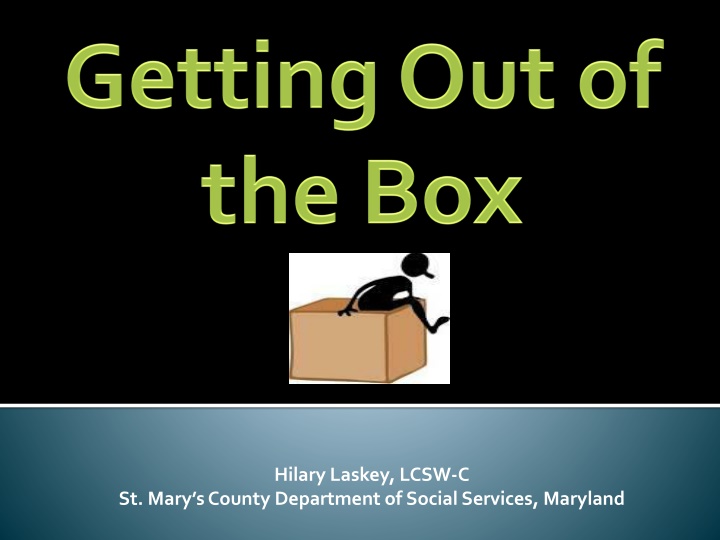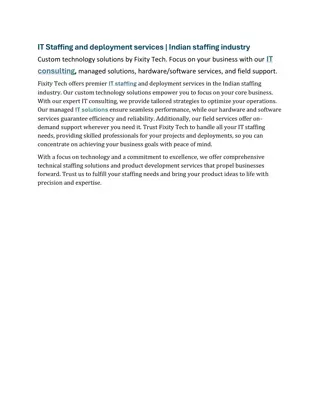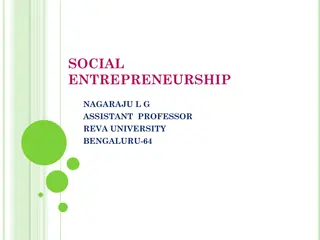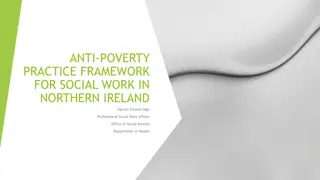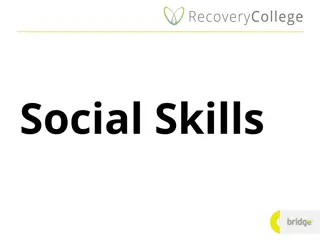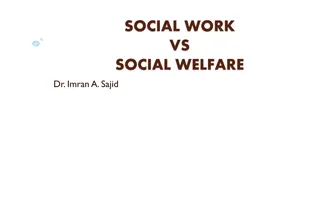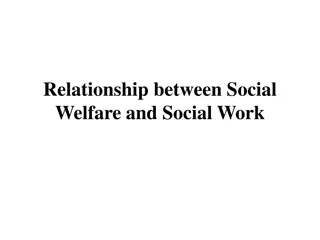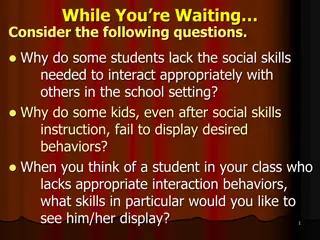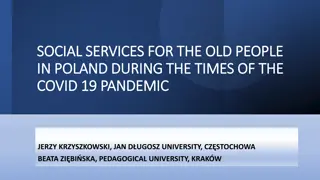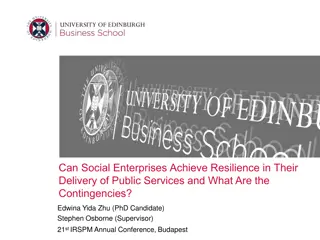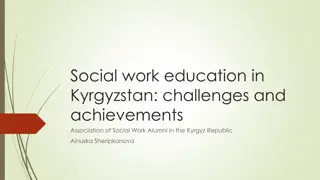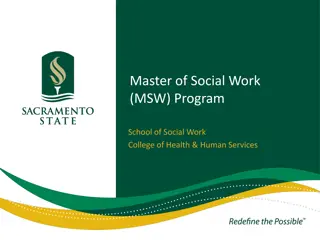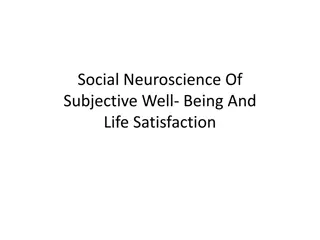Challenges and Solutions in Social Services
Handling conflicting demands, billable hours, insurance criteria, and client needs, social service professionals face challenges such as lack of resources, isolation, and regulatory constraints. Supervisory conflicts, burnout, and boundary violations may lead to disillusionment. The services provided involve multi-dimensional support to individuals, families, and communities, with a team approach. Various roles like Director, Assistant Director, and Program Specialist are essential in delivering services effectively.
Download Presentation

Please find below an Image/Link to download the presentation.
The content on the website is provided AS IS for your information and personal use only. It may not be sold, licensed, or shared on other websites without obtaining consent from the author.If you encounter any issues during the download, it is possible that the publisher has removed the file from their server.
You are allowed to download the files provided on this website for personal or commercial use, subject to the condition that they are used lawfully. All files are the property of their respective owners.
The content on the website is provided AS IS for your information and personal use only. It may not be sold, licensed, or shared on other websites without obtaining consent from the author.
E N D
Presentation Transcript
https://encrypted-tbn0.gstatic.com/images?q=tbn:ANd9GcTcHyDQMJ7c1dHbgMw9UvTeChS_okyBNlf-O3uz6Hb1Zk5a2iruLpgII2chttps://encrypted-tbn0.gstatic.com/images?q=tbn:ANd9GcTcHyDQMJ7c1dHbgMw9UvTeChS_okyBNlf-O3uz6Hb1Zk5a2iruLpgII2c Hilary Laskey, LCSW-C St. Mary s County Department of Social Services, Maryland
Conflicting demands Billable hours Insurance criteria/requirements Client needs Paperwork/documentation Supervision Meetings (internal/external) Agency expectations Accountability Lack of staff Lack of resources Isolation Lack of growth opportunities/training Regulations (federal, state, etc) Who sets the limits? Who controls your day to day? What do you wish you could do? What can you do?
Challenges Conflicts are similar to supervisee s but also include: Accountability for/to the agency higher management Multiple worker needs to manage/support/balance Isolation Sandwich feeling
Disillusionment Burnout Poor decision making Boundary violations
What services do we provide to our customers?
The services we provide occur in a multi-dimensional environment. Community Individuals are assisted in their families and in the community in which they live. Family/ Geo Team Invest in all three. Teaming process can mirror this specific need expanded to geo team services. Individual/ Program
Director Assistant Director for Services Assistant Director of Operations Team Leaders Leonardtown Lexington Park Program Specialist for Program Specialist for Team Staff Child Welfare Protective Services Family Services Family Investment Child Support Employment Training Child Protective Services Child Support Family Investment Family Services TCA Special Services Employment Training Foster Care Program Integrity Accountability
Is the engine of organizational learning which encompasses multiple areas of expertise and engages in a variety of activities & expands knowledge and expertise Crucial learning activities take place within smaller, focused units of action for organizations to improve and innovate Teaming is an essential aspect of PQI process/way of trying new ideas & practices to move an individual or family forward
What teams are we a part of?
Program Teams (CPS, TCA) Divisional Teams (Family Investment, Child Support Enforcement) Geo Teams (Leonardtown, Lexington Park) DSS (St. Mary s County) Community (St. Mary s County) State (Maryland)
Noun physically located in same place & learn to interact, develop trust and knowledge of one another s roles Geo Team Verb dynamic activity of coordinating & collaborating; still need to be able to share crucial knowledge quickly, ask questions clearly and frequently Staffing/Teaming
Vision: We envision a St. Marys County of healthy communities in which individuals and families are safe and thriving. Mission: St. Mary s County Department of Social Services, in conjunction with our community partners, is dedicated to empowering and protecting individuals and families as they seek stability and self-sufficiency.
Workplace Values: The SMCDSS staff believes in: RESPONSIBILITY & ACCOUNTABILITY essential to the creation and maintenance of trusting and productive relationships. COMMUNICATION essential for open and continuous sharing of knowledge, the work we do, and the results we achieve. TEAMING an interdisciplinary way of doing business based on knowledge sharing, mutual ownership and collaborative decision- making RESPECT as a positive behavior we display and promote in our interactions with others EXCELLENCE essential as the standard against we measure ourselves. EMPOWERMENT as the outcome of a process that develops skills, provides support and creates opportunities for self-improvement and self-sufficiency
Organizational Value: TEAMING Behaviors: Supporting colleagues having each other s backs Sharing program knowledge Respecting the program knowledge and practice of others Being inclusive Acting as part of the whole Collaboration Share problems and successes Accepting the big picture and acting that way Ability and willingness to adapt and change
Siloing is still very hard to break since it is a construct of the larger hierarchy (DHR) People are hired for specific jobs and trained in the aspects of these roles/ often little time taken or available to learn the rest of the organization Specific expectations/targets of each of program is presented as the goal What are the performance measures for FI, CSE, TCA/ETC, CPS, FC, AS, FS, Finance, HR?
Less feasible to have static teams coordination & collaboration are still essential but need to be fluid, which means teaming needs to be about reaching out, getting up to speed, establishing who is on the team and what they bring and try to make progress, all without a blueprint Learning & execution occur simultaneously Skills required: Interpersonal awareness Skillful inquiry Ability to teach others what you know
Interpersonal dynamics can affect teaming as most problems cannot be solved without cross- disciplinary collaboration This requires that individual participants recognize the interdependency of their roles Leading naturally to early & constant communication among separate programs though joint work reflection and feedback must take place once the task is completed (can be brief but must occur)
People need to speak up and to make this possible, it must be understood that failure is an option Failure will happen in a dynamic, unpredictable and ambiguous world; it is not the goal but does occur It takes courage to be direct, hold high expectations and to understand that uncertainty and risk are part of the work so failure does occasionally happen
There is a built in tension between learning and performance along with a natural relationship to maintain or improve performance, learning is required Group dynamics affect organization s ability to learn interpersonal fear has debilitating affects on the collective learning process Learning is: Process of action; Reflection; and New (often modified) action
This promotes performance in 2 fundamental ways: 1. Learning helps people develop skills and acquire knowledge Relative performance/Gap filling improving performance by acquiring necessary skills or knowledge to do what others already know how to do
2. Learning occurs in reaction to changes in the world that require brand new responses Promotes performance by discovering and inventing new ways to respond that improve performance in some endeavor no role models Learning is paving new ground, often through trial and error Performance is improved by better fit between capabilities and environment s demands
Learning is messy there is no instruction manual & usually performance gains won t show immediately There is no guarantee that the learning is the right kind A transition process is required Performance may worsen on the way to improving Trial and error does not look like good performance
Organizational learning Process of cascading team learning activities independently carried out but interdependent on organizational performance
When focus is on becoming a team Struggle or resistance to taking a risk in submitting final result to a group process rather than individual (inbred reaction) People/roles become more important than the process Too much focus on the what
Focus shift to performance, goal becomes end product; team is means, not the end Commitment of team is on their common purpose Performance ethic becomes the culture Members commitment to one another s growth & development as well as the end product Individual & mutual accountability Focus on the how method instead of results
An innovative organization has a teaming culture Teaming is an expectation It evolves through: Curiosity drives people to find out what others know, bring to the table and what they can add 1. Passion fuels enthusiasm and effort; care enough to stretch, go all out 2. Empathy ability to see another s perspective which is crucial to effective collaboration under pressure 3.
Team Leader FI Services Intake FI PS Customer Services PS CSE Community Partners
Rita 82 Susie 64 4 Matty 40 3 Nat 41 Buddy 46 Walter 32 Mike 38 Nancy 25 Dan 39 Junior 9 Michelle 8 Ryley 6 Slick 2 Wally 3
Mom Nancy 25 Children Slick (boy) 2; Wally (boy) 3 [Father Walter 32]; Ryley (girl) 6; Michelle (girl) 8 [Father Mike 38]; Junior (boy) 9 [Father Buddy - 46] Boyfriend Dan 39 Live with Rita 82, great-grandmother with diabetes & high blood pressure (bed-ridden) and Susie 64, grandmother with COPD & obesity - live in a 3 bedroom house with a housing subsidy under Rita s & Susie s names Nancy is also on the voucher with her children. Occasionally in the home are Matty (40), Rita s grandson who uses drugs/drinks and has criminal history and Susie s son/Nancy s uncle Nat (41) who has the same issues they often hang together FS/MA application Basic info assistance in getting food & no health insurance Additional info job loss recently, 9 yr old having trouble in school which led to job loss, potential housing concerns CPS referral - can come from variety of sources school, dr s, hospital, therapist, neighbor, family Basic info neglect children going to school dirty/hungry Additional info DV situation w/current boyfriend, mom never graduated school, hx of CPS as child CSE intake Basic info seeking support from ex-boyfriend/father of 2 children Additional info living w/relatives w/SA issues, several young children in home, mom overwhelmed/depressed EA application Basic info utility shut-off (2nd notice from SMECO) Additional info housing could be lost due to utility, caring for disabled relative, currently working w/in-home services due to CPS investigation
Amy Edmondson Economist at Harvard Business School Teaming: How Organizations Learn , Innovate and Compete in the Knowledge Economy & articles in Working Knowledge The Wisdom of Teams Jon R. Katzenbach and Douglas K. Smith The Team Handbook Peter R. Scholtes Seamless Government Russell M. Linden
Hilary Laskey, LCSW-C Assistant Director - QA St. Mary s County Department of Social Services Leonardtown, MD 240/725-5761 hilary.laskey@maryland.gov
